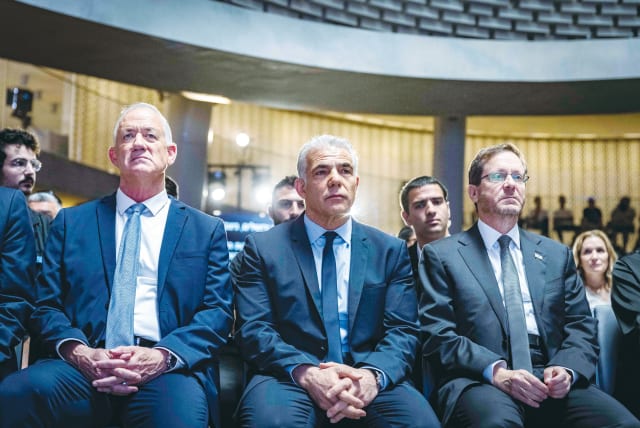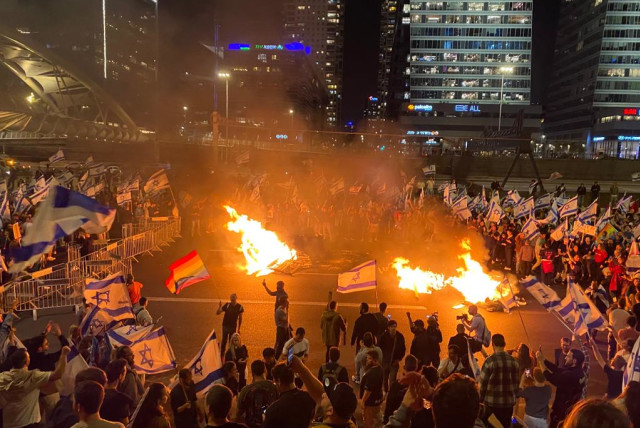Civil uprising or legitimate reform? - opinion

With the volatility and constant change in the Israeli internal arena, it is still unclear how this shall all play out.
What on earth is going on in Israel?
Since the launch of the newly-elected Netanyahu-led coalition several months ago, Israel’s politics have been roiled by a profound internal debate over a series of judicial reforms proposed by its new government.
At its core, Israel’s ruling coalition seeks to rebalance the composition and authorities of Israel’s Supreme Court to bring it more in line with and make it more subservient to the country’s executive branch. In the coalition’s view, there has been strong activism practiced on the part of the judicial arm in general and the Supreme Court in particular over the last 20 years, perceived by some to override the will of the people and their elected politicians.
In practice, since the transformation and strengthening of the Supreme Court, put in place by former Supreme Court president and world-renowned jurist, Aaron Barak, 22 decisions taken by the Knesset have been overturned by the Supreme Court until today. For some, that is “only 22” over the course of several decades. For others, the emphasis is on the aspect that these are 22 court rulings that were made against decisions taken by elected officials based on the will of the people.
The current judicial overhaul is opposed by many in Israeli society, as the Israeli political system lacks the checks and balances to the executive arm, which exist in many other Western countries, such as a second house of the legislature or a constitution. Thus, the Supreme Court remains at times the only authority able to contest the actions taken by the political executive and/or legislative arm in Israel.
The resulting political crisis now engulfing the country is the most consequential in Israel’s 75-year existence.
While many Israelis agree with the notion that the Supreme Court should be reformed to some degree, the way in which this transformation was intended to occur by the current ruling coalition took the public by surprise. An overhaul of the judiciary did rank as a priority for the current government when it took office late last year. Yet the intensity and pace of the recent attempt to put this significant legislation into practice, without what appears to be sufficient public and legislative discourse within the relevant legislative committees in the Knesset has raised unprecedented havoc.
A DISTINCT lack of trust between the country’s political Left and Right, together with strong opposition to long-serving Prime Minister Benjamin Netanyahu, have also undeniably fueled hundreds of thousands of Israelis to demonstrate on a weekly basis since January. Nonetheless, demonstrators also include the older generation, who has had a hand in the creation and the establishment of Israel, some of Israel’s salt of the earth.
Among them are IDF reserve officers and soldiers, significant hi-tech engineers and young businesspeople, as well as an unprecedented number of Russian speakers, who had previously refrained from taking to the streets for any reason. There is also a growing number of Likud voters who maintain their right-wing political views but do not any longer see the current government as a responsible and trustworthy leadership.
Civil turmoil having significant impact on Israel's economy
The situation is having a significant and growing impact on Israel’s economy. In mid-April, credit rating agency Moody’s downgraded Israel’s economic outlook from “positive” to “stable.” While last year, Israel’s economy grew by over 8%, suggesting that the fundamentals of Israel’s economic performance remain sound, the future looks less rosy. The country has received virtually no foreign direct investment since the start of the year.
Capital flight is also evident, with an estimated $4 billion (NIS 14.6 b.) departing to date. Thankfully, no other downgrades were made so far – a fact that Netanyahu and Foreign Minister Bezalel Smotrich hail as economic success. Yet this trend may well not continue, if the reform does go through and given the mounting financial instability which is exacerbated by the coalition’s recent budget deliberations, including the pledging of large sums of coalition funds to the ultra-Orthodox sector. The resulting lack of economic growth will be a clear factor.
Under immense pressure created by ongoing demonstrations, coupled with many international and local analyses warning of significant economic repercussions, Netanyahu temporarily paused the judicial overhaul, pledging to take up the issue once more later this year.
Negotiations between the government and Israeli opposition representatives continue, under the auspices of President Isaac Herzog. However, massive protests against the measures continue, particularly given the acute lack of trust of large portions of the Israeli public over whether these talks are held in good faith. Messaging from certain, more moderate factions of the opposition allow for the possibility that these talks will, indeed, lead to an agreed solution.
Yet that is coupled with significant skepticism even amid the most moderate among them. Others, however, are outrightly distrustful of the sincerity of the talks and voice their fear that this is yet another mechanism of manipulation orchestrated by Netanyahu to divert attention away from other disputable legislation that is simultaneously being pushed by the coalition.
STRATEGICALLY, OBSERVERS are adamant that the recent political unrest has emboldened Israel’s adversaries, who are now actively testing whether the country remains as strong as it was beforehand. Israel’s recent strong retaliation against the jihadist launch of rockets on Israeli civilians was certainly an attempt to indicate that despite internal strife and division, the Israeli military’s capability and willingness to protect its citizens, no matter who is at the helm, remains strong.
While the military operation was taking place, most demonstrators did not take to the streets, both owing to the security threat, as well as to demonstrate that there is no division when it comes to Israel’s security. Those who did demonstrate were mostly hardcore Jewish and Arab leftist activists. However, with the operation over, demonstrations will undoubtedly persist with vigor, while the negotiations continue, behind closed doors at the President’s Residence; that is, in parallel to ongoing legislative moves promoted and led by the coalition which many civilians find increasingly disturbing.
The turmoil has also had an adverse effect on what is arguably Israel’s – and more so Netanyahu’s – most important foreign policy achievement: the Abraham Accords. Two-and-a-half years old, the normalization agreements signed in 2020 between Israel and the United Arab Emirates, Bahrain and Morocco have reaped enormous dividends for Israel, including a surge in regional economic activity, tourism and closer political contacts with once-inaccessible neighbors.
Publicly, analysts have maintained an optimistic outlook about this new era of ties, and the prospects of future partnerships, including with Saudi Arabia. In practice, the agreements have entered a kind of observation period.
Given the aforementioned developments and, for the first time in years, recent polls are unflattering to the Likud while showing growing support for the centrist National Unity Party of former defense minister Benny Gantz. It appears that the Israeli public is fatigued with division, strife and internal chasms.
Yet with the volatility and constant change in the Israeli internal arena, not to mention the fragile security situation, it is still unclear how this shall all play out.
The writer is the founder and the CEO of Ruth-Strategic Consulting, a former MK for the National Unity Party, a former deputy ambassador to Cairo and a past adviser to president Shimon Peres.
Jerusalem Post Store
`; document.getElementById("linkPremium").innerHTML = cont; var divWithLink = document.getElementById("premium-link"); if (divWithLink !== null && divWithLink !== 'undefined') { divWithLink.style.border = "solid 1px #cb0f3e"; divWithLink.style.textAlign = "center"; divWithLink.style.marginBottom = "15px"; divWithLink.style.marginTop = "15px"; divWithLink.style.width = "100%"; divWithLink.style.backgroundColor = "#122952"; divWithLink.style.color = "#ffffff"; divWithLink.style.lineHeight = "1.5"; } } (function (v, i) { });

